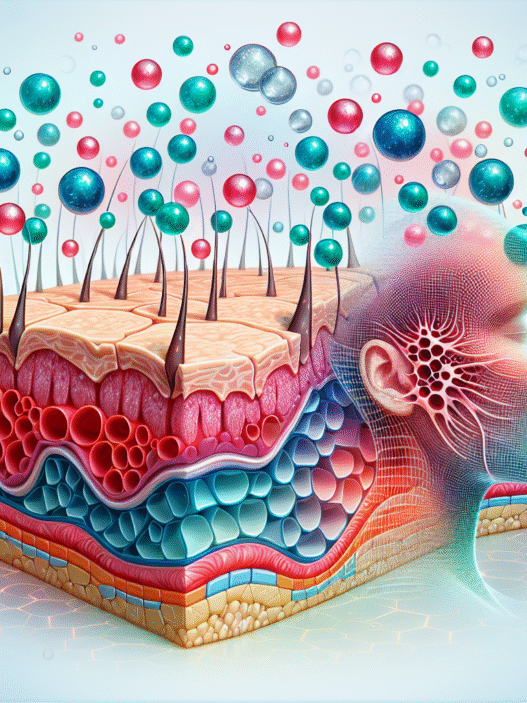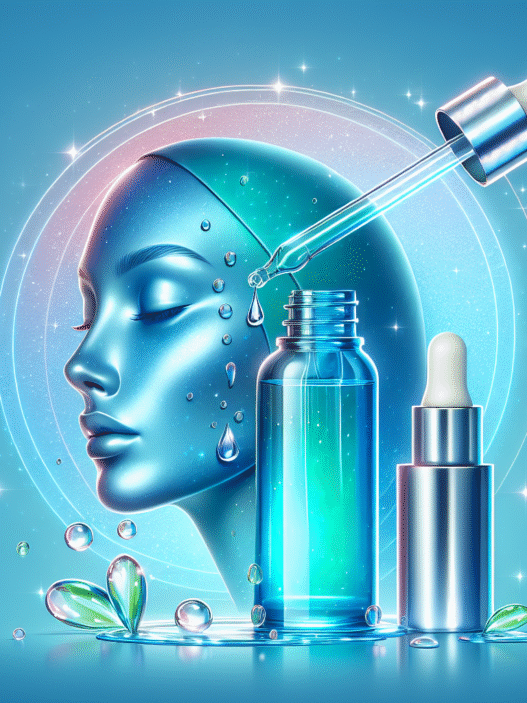Understanding Hyaluronic Acid
Hyaluronic acid (HA) is a naturally occurring substance in the body, primarily found in the skin, joints, and connective tissues. It plays a vital role in maintaining skin hydration, elasticity, and overall health.
Role in Skin Health
Hyaluronic acid is known for its incredible ability to attract and retain moisture. It can bind to over 1,000 times its weight in water, making it one of the most effective moisturizers available (Healthline). This capability helps to maintain skin hydration and ensures that the skin remains plump and youthful. Additionally, long-term use of hyaluronic acid serum can improve overall skin health and flexibility, resulting in a softer, stretchier appearance (Cleveland Clinic).
| Benefit of Hyaluronic Acid | Description |
|---|---|
| Moisture Retention | Binds to 1,000 times its weight in water. |
| Skin Elasticity | Enhances the skin’s flexibility and plumpness. |
| Hydration | Maintains proper skin barrier function and hydration levels. |
Source and Function
Hyaluronic acid is produced naturally by the body, predominantly in the skin. It serves multiple functions, including promoting hydration, supporting tissue repair, and playing a crucial role in the healing process. HA acts as a scaffold structure for tissue growth, facilitating the healing of wounds (Cleveland Clinic).
While the body synthesizes hyaluronic acid, its levels decrease with age, leading to reduced skin elasticity and increased dryness. To counteract these changes, many people turn to hyaluronic acid products, such as serums and moisturizers, to replenish the skin’s moisture content and maintain a youthful appearance. Various forms of hyaluronic acid are available in skincare products, including hyaluronic acid serums and hyaluronic acid moisturizers, which provide direct benefits to the skin.
In summary, hyaluronic acid is a key ingredient in skincare that not only hydrates but also promotes healing and enhances the overall quality of the skin. By incorporating products containing HA, individuals can help mitigate the signs of aging and maintain a healthy complexion.
Benefits on Skin Appearance
Incorporating hyaluronic acid into skincare routines can offer significant benefits for skin appearance. This powerhouse ingredient is known for its ability to reduce wrinkles, increase hydration, and enhance skin elasticity.
Reduction in Wrinkles
Topical hyaluronic acid (HA) has been extensively studied and shown to effectively reduce the appearance of wrinkles. In a comparison with a placebo, research has demonstrated that HA contributes to improved skin appearance by lessening fine lines and the depth of wrinkles (NCBI). Furthermore, when used together with Botulinum Toxin Type A (BoNTA), hyaluronic acid can prolong the effects of the treatment, yielding longer-lasting results in wrinkle reduction and skin texture improvement.
| Study Findings | Results |
|---|---|
| Study on HA effectiveness | 14% reduction in wrinkles after consistent use over weeks. |
| Combination of HA with Botox | Enhanced skin texture and improved skin elasticity. |
Increased Skin Hydration
One of the most notable benefits of hyaluronic acid is its exceptional ability to increase skin hydration. A 2021 study involving 40 women, aged 30 to 65 with signs of photoaging, found that applying topical HA twice daily resulted in significant improvements in hydration after just six weeks. Participants reported enhanced skin texture and brightness. In another study assessing a HA facial serum, a sustained increase in skin hydration of up to 55% was observed at week six, along with notable improvements in overall smoothness and plumpness.
| Improvement Metrics | Week 6 Results |
|---|---|
| Skin Hydration | +55% |
| Skin Smoothness | +64% |
| Skin Plumpness | +60% |
Enhanced Skin Elasticity
Hyaluronic acid not only aids hydration but also plays a vital role in enhancing skin elasticity. Improved elasticity is crucial in combating the signs of aging. Studies have shown that topical application of hyaluronic acid can lead to measurable increases in skin tightness and elasticity, contributing to a youthful glow and appearance. This is especially beneficial for individuals looking to rejuvenate their skin after procedures or as part of daily anti-aging efforts.
In summary, hyaluronic acid is a multifaceted ingredient that delivers substantial benefits for skin appearance through wrinkle reduction, heightened hydration, and improved elasticity. For those interested in harnessing these effects, various options exist, including hyaluronic acid serums, moisturizers, and injections.
Safe Usage and Application
Understanding the correct usage and application of hyaluronic acid is crucial for anyone aiming to enhance skin health through this ingredient. This section discusses various forms of hyaluronic acid, including over-the-counter products, oral supplements, and prescription products and injections.
Over-the-Counter Products
Hyaluronic acid is widely available in over-the-counter products. These include serums, moisturizers, and eye care products that are considered safe for daily use. Many beauty enthusiasts opt for hyaluronic acid serum for its hydrating properties and ability to plump the skin. When selecting a product, it’s essential to check the concentration of hyaluronic acid and choose a formulation that suits individual skin needs. The Cleveland Clinic emphasizes consulting with a healthcare provider if there’s any uncertainty about which products to use.
| Product Type | Example | Key Attribute |
|---|---|---|
| Serum | Hyaluronic Acid Serum | Deep hydration |
| Moisturizer | Hyaluronic Acid Moisturizer | Locks in moisture |
| Eye Care Product | Hyaluronic Acid Eye Cream | Reduces puffiness |
Oral Supplements
In addition to topical applications, hyaluronic acid is available in oral supplement forms. These supplements are also deemed safe to consume; however, it is crucial to consult healthcare providers to ensure they are appropriate for individual health conditions or dietary needs. For those interested in enhancing hydration and promoting skin health from the inside out, hyaluronic acid supplements can be a beneficial addition to their routine (Cleveland Clinic).
| Supplement Type | Dosage | Benefits |
|---|---|---|
| Capsule | 100-200 mg daily | Supports joint health |
| Powder | Follow package instructions | Improves skin hydration |
Prescription Products and Injections
Prescription formulations of hyaluronic acid, including injections for skin or joint health, should only be administered by licensed medical professionals. These products can provide immediate results and are tailored to meet specific medical or aesthetic needs. Misuse or self-administration can lead to complications or adverse effects. Individuals considering hyaluronic acid injections for cosmetic enhancement should always consult with a qualified healthcare provider to understand the risks involved.
| Injection Type | Purpose | Administration |
|---|---|---|
| Dermal filler injection | Plumps skin and reduces wrinkles | Administered by a professional |
| Joint injection | Treats osteoarthritis | Administered by a professional |
By utilizing hyaluronic acid safely in its various forms, individuals can experience substantial benefits for skin health and hydration. Explore more about the advantages of this ingredient in our article on hyaluronic acid benefits to learn about its numerous applications.
Hyaluronic Acid in Skincare
Hyaluronic acid has become a star ingredient in the skincare industry, known for its remarkable properties that enhance skin health. From deep moisturization to wound healing, its effects on the complexion are profound.
Moisturizing Properties
Hyaluronic acid is widely celebrated for its ability to absorb water. A quarter teaspoon of hyaluronic acid can hold about one and a half gallons of water, making it an excellent choice for hydrating formulations (Cleveland Clinic). This incredible capacity allows it to effectively bind moisture to the skin, providing deep hydration and helping to combat dryness.
| Measurement | Water Capacity |
|---|---|
| 1/4 teaspoon | 1.5 gallons |
Its ability to hold up to 1,000 times its weight in water enhances skin hydration significantly. This is especially beneficial for those with dry or dehydrated skin, who can see noticeable improvements in their complexion after using products containing hyaluronic acid (Healthline).
Wound Healing Benefits
Beyond moisture retention, hyaluronic acid supports skin healing. It plays a role in tissue repair, as it is a natural component of skin. This ingredient helps accelerate wound healing by regulating moisture levels, reducing inflammation, and promoting the production of new skin cells.
Hyaluronic acid not only assists in the recovery of minor cuts and scratches, but it also contributes to maintaining the skin barrier’s integrity. This makes it a valuable addition in formulations aimed at promoting healing or post-procedure care.
Skin Rejuvenation Effects
In addition to moisture and healing, hyaluronic acid offers skin rejuvenation effects. It improves skin elasticity and firmness, giving the skin a plumper appearance. This rejuvenating quality is significant for those looking to combat signs of aging. As the skin ages, it loses its natural hyaluronic acid content, leading to dryness and reduced elasticity.
By incorporating products like a hyaluronic acid serum or a hyaluronic acid moisturizer, individuals can support their skin’s moisture levels and help restore its youthful Look. The inclusion of hyaluronic acid in a skincare routine can lead to smoother, more hydrated skin with improved texture and tone.
For those interested in the broader benefits of hyaluronic acid, it can be explored in various forms such as hyaluronic acid injections and hyaluronic acid supplements, offering versatile options for skin health.
Impact of Hyaluronic Acid on Skin Aging
Hyaluronic acid has become a prominent ingredient in skincare products due to its significant benefits related to skin aging. Its hydration properties, ability to enhance skin volume, and overall contribution to a fresh complexion make it an essential consideration for beauty enthusiasts.
Hydration and Skin Volume
As people age, the body becomes less efficient at producing hyaluronic acid, leading to reduced skin volume and glow. This decline can be exacerbated by environmental factors such as UV exposure, smoking, and poor nutrition. Hyaluronic acid possesses the remarkable capacity to hold up to 1,000 times its weight in water, making it an effective hydrator for aging skin (Silver Mirror).
The table below illustrates how hyaluronic acid contributes to skin hydration:
| Aspect | Benefit |
|---|---|
| Water Retention | Holds up to 1,000 times its weight |
| Skin Volume | Helps restore lost volume |
| Glow | Improves overall skin radiance |
Plumping and Freshness
Hyaluronic acid plays a key role in plumping the skin, resulting in a fresher appearance. By attracting moisture into the skin, it helps to reduce the visibility of fine lines and wrinkles, creating an effect similar to “filling” the skin to improve its texture. This plumping effect is essential for maintaining a youthful complexion.
The skin benefits from regular application of hyaluronic acid in various forms, including hyaluronic acid serums and moisturizers, allowing for optimal hydration and elasticity.
Ingredients for Skin Benefits
Hyaluronic acid is suitable for all skin types, including sensitive and acne-prone skin. It is non-comedogenic, meaning it does not clog pores, making it ideal for individuals prone to breakouts (Silver Mirror). Its anti-inflammatory properties further enhance its appeal for helping individuals with sensitive or irritated skin (Silver Mirror).
Incorporating hyaluronic acid into a skincare routine can help combat the signs of aging while offering hydration and restoration to the skin. For further exploration of its effects, individuals can look into related topics such as hyaluronic acid and collagen and hyaluronic acid injections for enhanced skin rejuvenation.
Different Molecular Weights of Hyaluronic Acid
Hyaluronic acid (HA) is a powerful ingredient in skincare, but its effectiveness can vary based on its molecular weight. Understanding the differences between low and high molecular weight HA is essential for maximizing its benefits, particularly in terms of skin plumping and hydration.
Low vs High Molecular Weight
Hyaluronic acid exists in various molecular weights, each affecting its absorption and efficiency in the skin. Low molecular weight HA can penetrate deeper layers of the skin, providing significant benefits such as reducing wrinkle depth and improving overall hydration (Healthline). In contrast, high molecular weight HA often remains on the surface of the skin and is less permeable, making it less effective for deeper skin issues but still beneficial for surface hydration.
| Molecular Weight | Absorption Capability | Skin Benefits |
|---|---|---|
| Low | High | Significant wrinkle reduction, deep hydration |
| High | Low | Surface hydration, non-irritating |
Penetration Abilities
The ability of hyaluronic acid to penetrate the skin varies greatly. Low molecular weight HA can pass through the stratum corneum, allowing it to effectively target deeper skin concerns, such as fine lines and wrinkles (PMC). High molecular weight HA is largely impermeable, primarily providing surface-level benefits and acting as a moisture barrier.
This difference in penetration directly impacts the efficacy of products containing HA. For optimal results, individuals may want to include products with both low and high molecular weight HA in their routine to benefit from both deep and surface hydration.
Skin Plumping and Hydration
The cumulative impact of low molecular weight hyaluronic acid on skin hydration levels and plumping effects is notable. Clinical studies have demonstrated that significant increases in skin hydration and plumpness can be achieved with regular use of HA serums. For instance, a study showed a sustained increase in skin hydration of 55% at week 6, with improvements in smoothness (64%), plumping (60%), and reduction in fine lines and wrinkles.
Incorporating a hyaluronic acid serum into the skincare routine can help enhance these results. The synergy between different molecular weights allows users to experience both immediate and long-term skin improvements while reaping the benefits of hyaluronic acid for skin health.





















